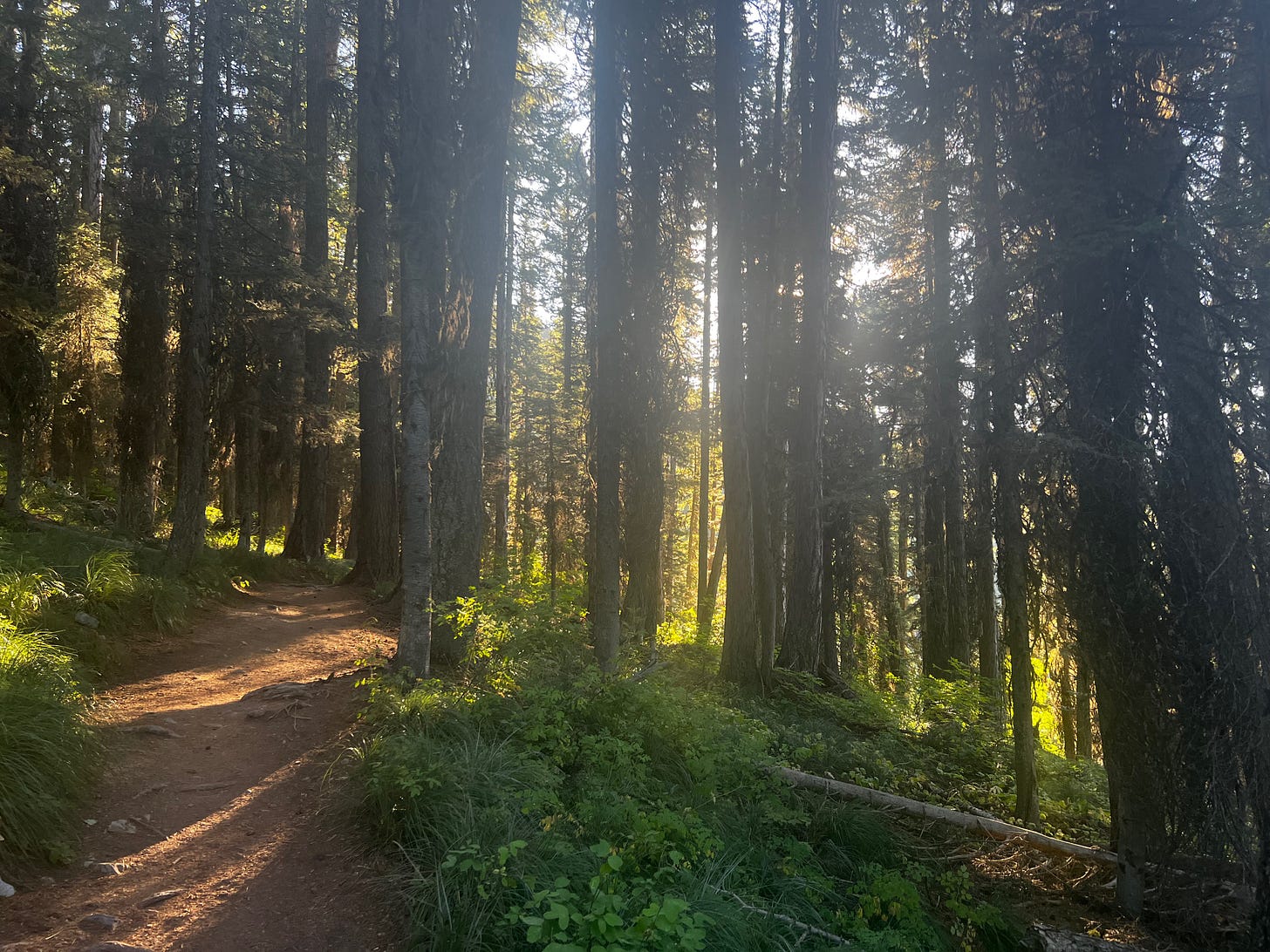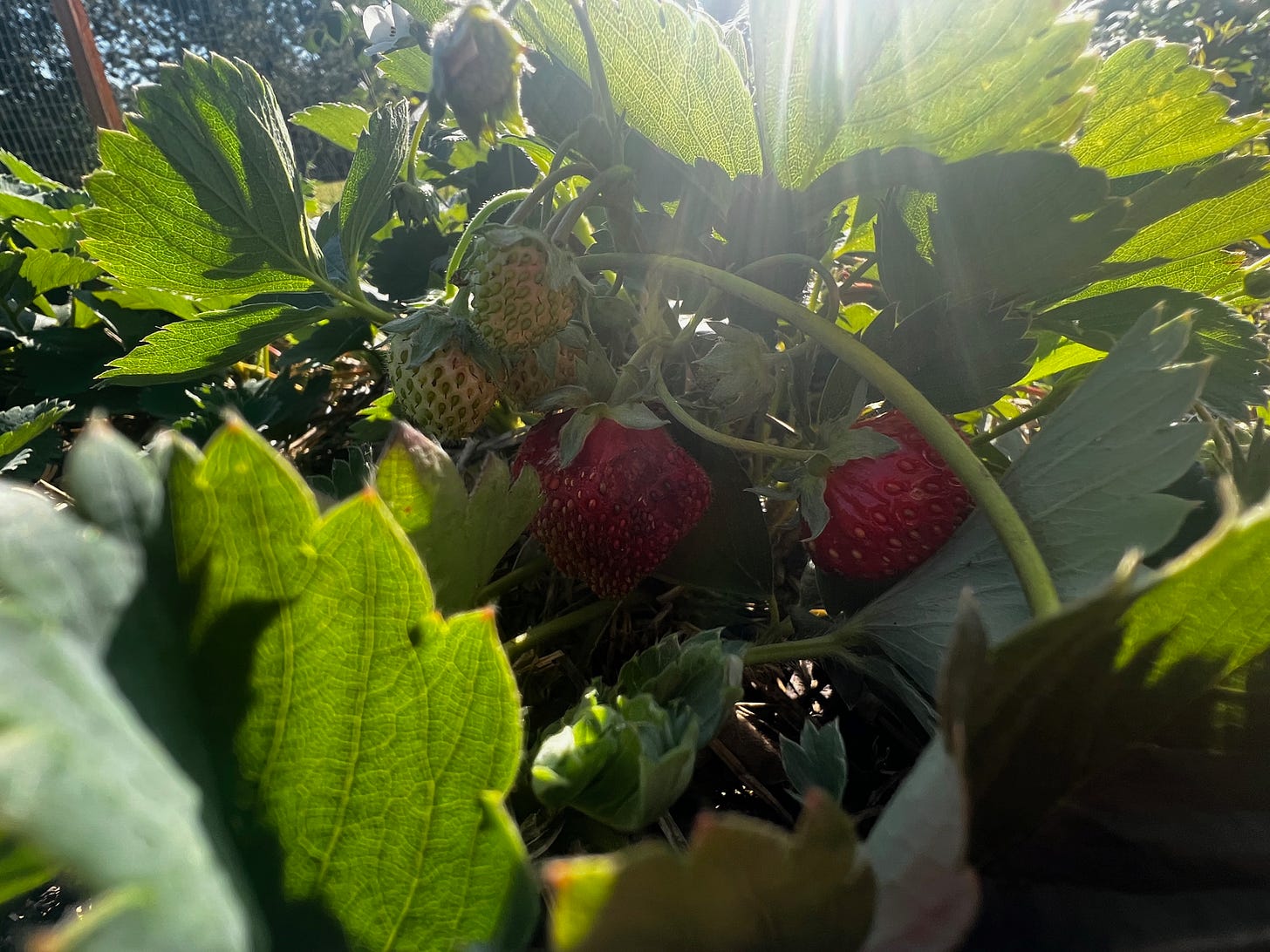
There’s a short space in my life between planting the last of the garden after early-June or late-May frosts, and preparing for winter. I like this seasonality. You might say the entire calendar of my being revolves around it: when I take my younger kid to our secret spot in the woods in July to eat as many huckleberries as they want for an hour, and a few weeks later when I’m picking huckleberries at higher altitudes and in greater quantities for the freezer. When I make chokecherry jelly and when the freestone peaches from Washington State come in—freestone are the easiest to skin and freeze—and canning tomatoes and drying mint and planning for hunting season and looking for plums to make into fruit leather and taking the truck out for firewood.
It’s a time of year when I start making work for myself, as I once put it to a friend. Work that doesn’t end until January, sometimes March, when I finish dehydrating and powdering the garlic put by in September. I don’t have to do any of it. But I like living this way, by seasons, and having opportunities to nurture relationship with the land I live among along with the acute annual reminders of how quickly things are changing.
Maybe because Montana summers are always so short, or because I grew up in a household where pickling things and making jam and eating from the garden and the woods was the norm, August has always felt like a time of preservation. A slow-time, bejeweled-time, not wearable jewels but rich with bright color the way sunlight looks through a jar of rhubarb syrup. Bee time and hoverfly time, watching them among the borage and oregano and radishes I let go to flower. Bird time and berry time, picking pecked-at strawberries and thinking of some small bird nabbing a bite in the early morning, her feet rustling lightly in the straw.

My walks around town this time of year take me by some of the chokecherry trees I rely on for making jelly; by the end of July last year, the chokecherries were already turning that particular shade of bright pie cherry-red that precedes their near-black ripeness—weeks earlier than they usually do. The huckleberries, too, ripened earlier than usual.
On one walk, I was picking and eating handfuls of serviceberries and thinking of Robin Wall Kimmerer, whose essay on serviceberries and kinship a reader sent me ages ago. It’s one of her pieces of writing I’ve returned to over and over, an essay that is itself a gift, about manufactured scarcity and what people have to do to deny the realities of abundance:
“When we speak of these not as things or products or commodities, but as gifts, the whole relationship changes. I can’t help but gaze at them, cupped like jewels in my hand, and breathe out my gratitude.
In the presence of such gifts, gratitude is the intuitive first response. The gratitude flows toward our plant elders and radiates to the rain, to the sunshine, to the improbability of bushes spangled with morsels of sweetness in a world that can be bitter.”
Though Kimmerer writes about what can be made with serviceberries, acts of creation and care that keep the gift flowing to birds and other humans—pies, jams—these berries are something I have particular affinity for because I don’t do anything with them, not even gather them for the freezer. I just eat them, or watch sparrows eating them out of the tree in my yard. It’s a richness that I can’t imagine any monetary wealth being able to replace, to feel the gratitude that comes with a mind-wandering walk and handfuls of berries so sweet that they’re like self-contained jam and so abundant that, even as they’re now drying up, the trees look barely touched by either humans or birds. Serviceberries are a world I want us all to have, a world I want to help rebuild.
August is when my personal year really starts. The tension of relentlessly long days eases enough that I can once again light a candle in the dark when I do my early morning writing, and see the stars and Moon before going to sleep at night. I’ve missed them.
It’s a season when my hands are busy and my attention is drawn constantly to the changes each day as chokecherries ripen, and huckleberries are ready to gather further up the mountains, when the potatoes suddenly need burying—like, two weeks ago—and somehow we don’t yet have wildfire smoke even though there is more than one fire burning nearby and one evening, while eating a dinner of sandwiches on the rocky beach, we watched helicopters dropping water on a fire at the far end of the lake. An hour later two tanker planes flew down to the water, scooped up, and headed off somewhere further north where a recent lightning storm started several fire complexes.

I could mark the start of my year with an equinox, or the turn of spring weather or the onset of summer. Or when the larches put out their first soft, fresh needles. Or when the new-green climbs visibly up the slopes of the ski hill and reaches the lingering patches of snow. I could mark it from when my kid’s huckleberry-grazing starts or when the tree swallows start nesting.
But these all feel like the ends of my old year. My new one starts when my spouse looks in the fridge and says there’s nothing to eat and I say there’s borscht and he says, “Borscht isn’t food.”
That’s when I feel the internal calendar of my year shift, a new one beginning with something that feels ancestral, or even primal: looking at the short season of growth and ripening that has barely begun, and the long months of dark and cold ahead and thinking, “How will I feed everyone?” When my fingers are often sticky and always stained—from beets, or huckleberries, or plain good dirt—and I’m fueled by what most people would probably think is too much borscht, and the pen and paper on my desk start to look a little like foreign countries for a while. Those tools of my writing trade like places I enjoy learning about and meandering around in but not something that has anything to do with my everyday life.
Do we all have our seasons? Mine are formed around the growth of things, of ripening and harvest, preservation for the near future, around the first snow and Moon’s waxing and waning, of ice on the river and larch needles turning orange and the donning and shedding of layers with the temperature. These things will change. Drastically, soul-breakingly, unjustly. All the more reason to attend to them as we can.
One of my closer friends has the unenviable job of cleaning up oil spills on rivers. She worked on the Yellowstone River for weeks last summer after a train derailment dumped molten sulphur and asphalt binder into the river. She and her crew worked fifteen-hour days throughout July, in the heat of eastern Montana. It sounds, I told her, like literal hell. As angry as I am about a world where that kind of thing can happen to a river, I’m also glad there are people like her who care enough to do a good job of that kind of work.
Over a weekend when she was finally home for a couple of days I made several dozen cookies for her and her crew and took them over to her house. It rained hard while I was baking and the kitchen smelled of cinnamon—for the snickerdoodles—and I thought, maybe this will dampen the two nearby fires before they get unmanageably big. I also thought, what an incredible thing it is to live in a world with cinnamon. Cinnamon exists. And rivers, and serviceberries, and people who care about all of it.
What’s beautiful about growing, foraging, hunting, and preserving food is that it’s not static and it’s not permanent. It’s for enjoyment and sustenance in the near future. It’s part of the very real abundance that “the economy” tries to hide.
And it’s part of our relationships to one another. Very little of the jam I make gets consumed in my house. I give most of it away, to be opened maybe in the dead of winter when the taste of fresh berries can remind someone that the year begins again. That the world is still full of gifts, and that we can be generous to one another, too.
What kinds of fragrance might linger with each of us from something we harvested long ago? What are you putting away this season for future you?
For me, today, it’s the liquid slowing of time as the morning sky lightens away from starlight, the two brand-new spotted fawns and their relatives nibbling grass all over my yard, the shift of air rustling a nearby mountain ash tree, the magpie staring at me from the other side of the screen, and a handful of berries.
Antonia Malchik writes On the Commons.






"Bee time and hoverfly time, watching them among the borage and oregano and radishes I let go to flower. Bird time and berry time, picking pecked-at strawberries and thinking of some small bird nabbing a bite in the early morning, her feet rustling lightly in the straw." Beautiful writing, Antonia, that seems to fit so well with the beauty of the sentiments expressed. It's hard to imagine a greater contrast than the one between the experience of the changing year in rural Montana on the one hand, and Tokyo, where I live, on the other. Yet it's also possible to appreciate the seasons here, helped by the Japanese love of seasonal fruits and flowers. During the heat of August people here listen for the sounds that hint at autumn on its way, the changes in the song of the cicadas, the first crickets. Thank you for helping me slow down to look and listen to the progress of the year.
"August has always felt like a time of preservation. A slow-time, bejeweled-time, not wearable jewels but rich with bright color the way sunlight looks through a jar of rhubarb syrup." Exquisite writing. I feel exactly the same way, having also grown up in a family that pickled and froze and preserved everything. As I wrote recently about pickles and hot sauce, hand harvested and preserved foods are edible prayers. I have much of that work waiting for me in Pennsylvania when I come home from Prague later this week.
As you also say near the end, these traditions help keep us in conversation with our home places and also with our neighbors. I preserve a year's worth of some foods for myself, but I make far more pickles than I can eat because it's the perfect thing to bring to a potluck or to gift to a friend.
One thing I've never been able to do is keep potatoes through the winter and then use my own potatoes for seed the next spring. Perhaps you can share your method for storing them? I should have 100+ pounds to harvest soon, and I'd love to plant some of my own stock next spring.